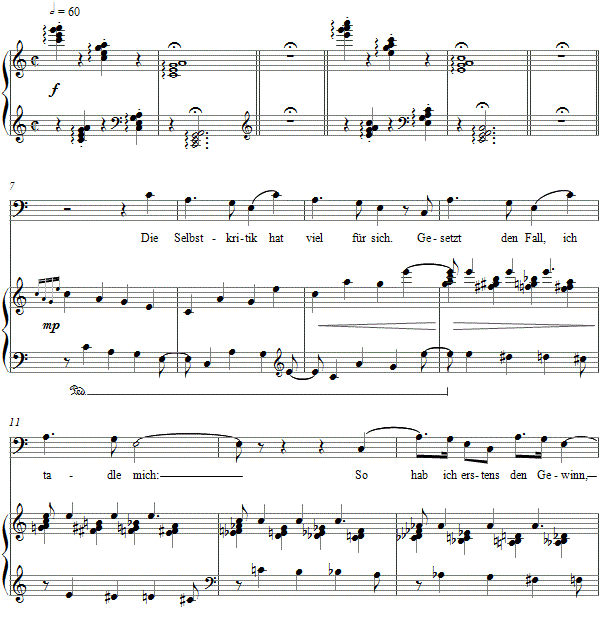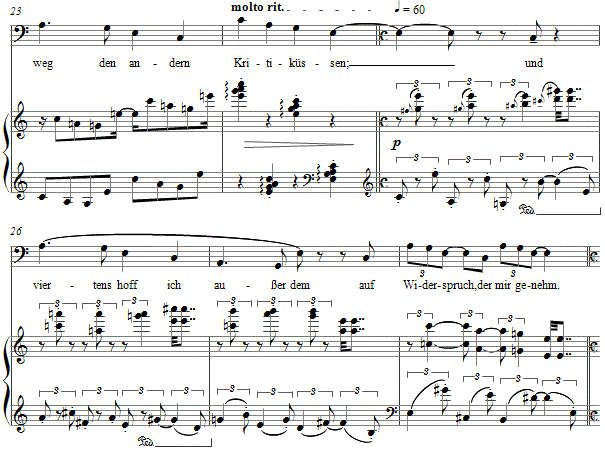Music and Texts of GARY BACHLUND
Vocal Music | Piano | Organ | Chamber Music | Orchestral | Articles and Commentary | Poems and Stories | Miscellany | FAQs
Die Selbstkritik hat viel für sich - (2012)
Wilhelm Busch
for bass or baritone and piano
Variationen über C-A-G-E
Die Selbstkritik hat viel für sich.
Gesetzt den Fall, ich tadle mich:
So hab ich erstens den Gewinn,
Daß ich so hübsch bescheiden bin;
Zum zweiten denken sich die Leut,
Der Mann ist lauter Redlichkeit;
Auch schnapp ich drittens diesen Bissen
Vorweg den andern Kritiküssen;
Und viertens hoff ich außerdem
Auf Widerspruch, der mir genehm.
So kommt es denn zuletzt heraus,
Daß ich ein ganz famoses Haus.3 pages, circa 1" 45"
Wilhelm Busch Selbstkarikatur
Amused at some recent planned performances of John Cage's Songbooks which are taken so terribly seriously these days, I thought of them as I read Busch's acerbic yet delightful rhyme. A fine English language translation of Busch's text has been made by Walter A. Aue, and may be found through this link to Emily Ezust's excellent site, The Lied, Art Song, and Choral Texts Archive. As with many of the projects John Cage put together, his particular avant garde perspective is meant to deflect some criticism through its own philosophical underpinnings, such as his oft-quoted and clever assertion, "If something is boring after two minutes, try it for four. If still boring, then eight. Then sixteen. Then thirty-two. Eventually one discovers that it is not boring at all." (At the casino this is called doubling down on your bet.) In that spirit, I therefore recommend that this song setting should be performed or not, or at least maybe not, or then again maybe. Zen yule zee watt Busch socked, odor knicked.
The theme is simple, as are some of Cage's melodic choices in repetition, so C-A-G-E is this setting's theme, melodically and harmonically as a chord form, in transposition and repetition.
A center section breaks the cut-time mood in tempo and notation, as an ersatz 12/8 recalls toy piano sounds in the upper register of the instrument. C-A-G-E becomes the tonal regions in another variation just for the fun of it. I mention the notion of "fun" because of an incident many years ago in Frankfurt performing John Cage's Europas 1 & 2, in which an audience member leapt onto the stage and danced with us, swinging her purse around in a large arch. Offstage, I heard on of the stage management frantically trying to call the police, and found that part of the amusement because chance was the method of combining materials, musical and theatrical, into the creation of the work. The audience member had her moment, and returned to her seat. The police were not called after all, and the performance did what it was supposed to do. Or not. But then again, "As far as consistency of thought goes, I prefer inconsistency." So he said. So it was. Inconsistent. Consistently. For this I am also amused when audience members attend the "silent" works of Cage and sit respectfully in their silence which is not meant to be so damn silent after all. Or, "...try as we may to make a silence, we cannot." Ah, how orthodox can the historic avant garde become in the halls of the cognoscenti. How consistent. How funny.
The score is available as a free PDF download, though any major commercial performance or recording of the work is prohibited without prior arrangement with the composer. Click on the graphic below for this piano-vocal score. And for more than thirty other settings of Busch's texts, click here.
Die Selbstkritik hat viel für sich


